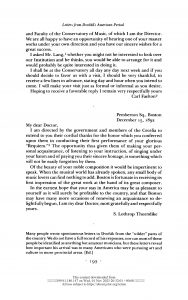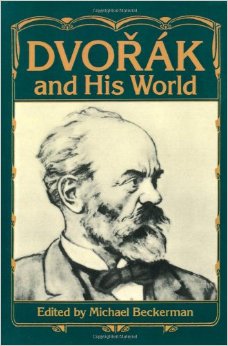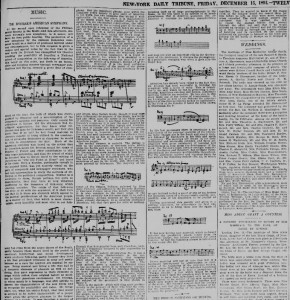The book Dvorak and His World by Michael Beckerman includes a chapter completely dedicated to correspondence received by Dvorak during his time in America.1 These letters are supposedly not published anywhere else and have never been seen before this book. There are a wide range of letters from pleasant greetings to desperate pleas, all of which demonstrate the kind of impact Dvorak had in the American community and the world as a whole.

Letter to Dvorak regarding Requiem premiere.2
These first few letters were received by Dvorak just before and after his Requiem was first performed in Boston. The second letter is from someone giving thanks to Dvorak on behalf of the Boston government. He states that the opportunity for Bostonians to hear a premiere Dvorak’s work directed by Dvorak himself and with the ability to meet Dvorak is not something easily forgotten. He concludes his letter by stating that it is difficult to find words to describe the beauty of his work and that “Boston is fortunate in receiving its first impression of the great work at the hand of its great composer.”3 He continues in hoping that Dvorak’s “stay in America may be as pleasant to yourself as it will surely be profitable to the country, and that Boston may have many more occasions of renewing an acquaintance so delightfully begun.”4 This letter demonstrates how much of a impact Dvorak had on the places he traveled. The language in this letter allows us to understand that the people of Boston greatly valued Dvorak’s visit and premiere, and it had a vast impact on Boston and its people.

Letters to Dvorak requesting his help.4
The second section of this chapter includes letters to Dvorak from parts of the world Dvorak was not near at the time. It is unclear whether or not Dvorak ever responded, but these letters show that Dvorak had a great impact on other parts of the world and that many people were languishing for his attention. The first letter comes from a remote location in California close to the Mexican boarder “remote and isolated that perhaps the place has never been brought to [Dvorak’s] notice.”5 They have a prosperous music society intensely studying the works of Dvorak and often come across numerous problems with obtaining copies of his scores due to their location. That being said, they have “great enthusiasm and reverence for the Master who is doing so much for the development of music in America” and they would just like to ask “Dr. Dvorak to send [them] a few words of encouragement and advice.”6 This cute interaction is one way of showing how impactful Dvorak was even on the smallest and most remote communities all so desperately wanting to learn and study Dvorak’s music.
Bibliography
Beckerman, Michael, ed. Dvorák and His World. Princeton: Princeton University Press, 1993. Accessed November 1, 2023. ProQuest Ebook Central.
Footnotes


